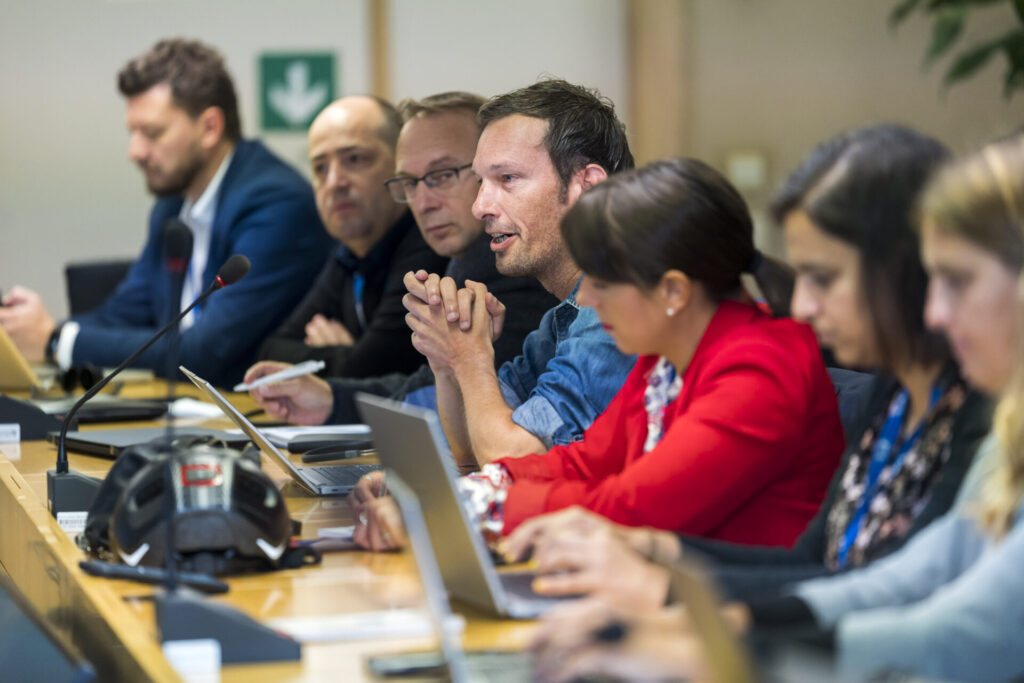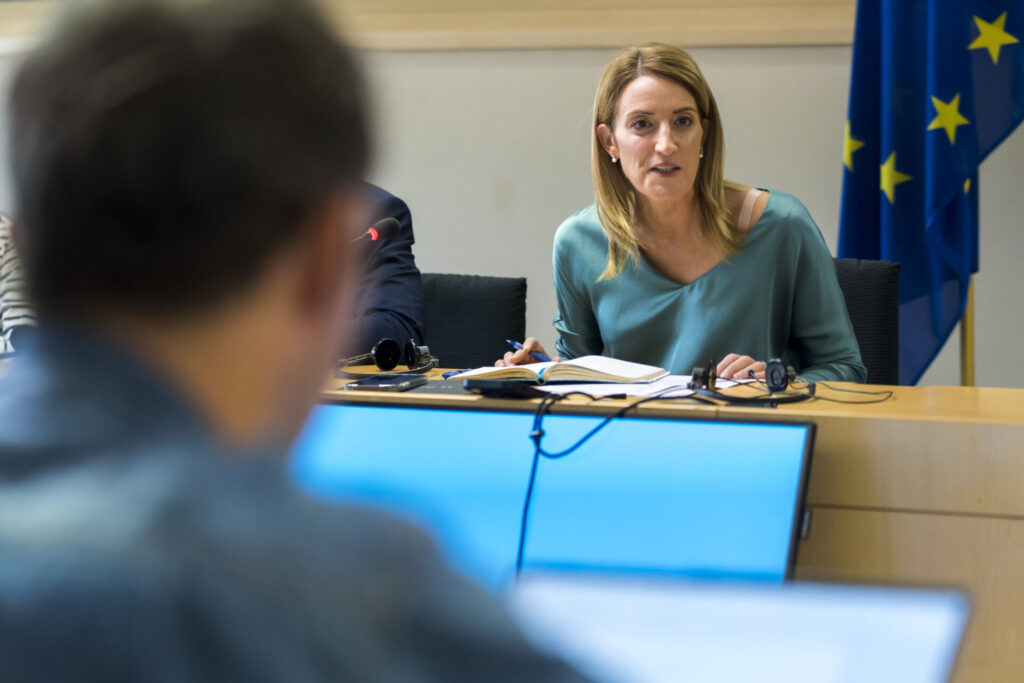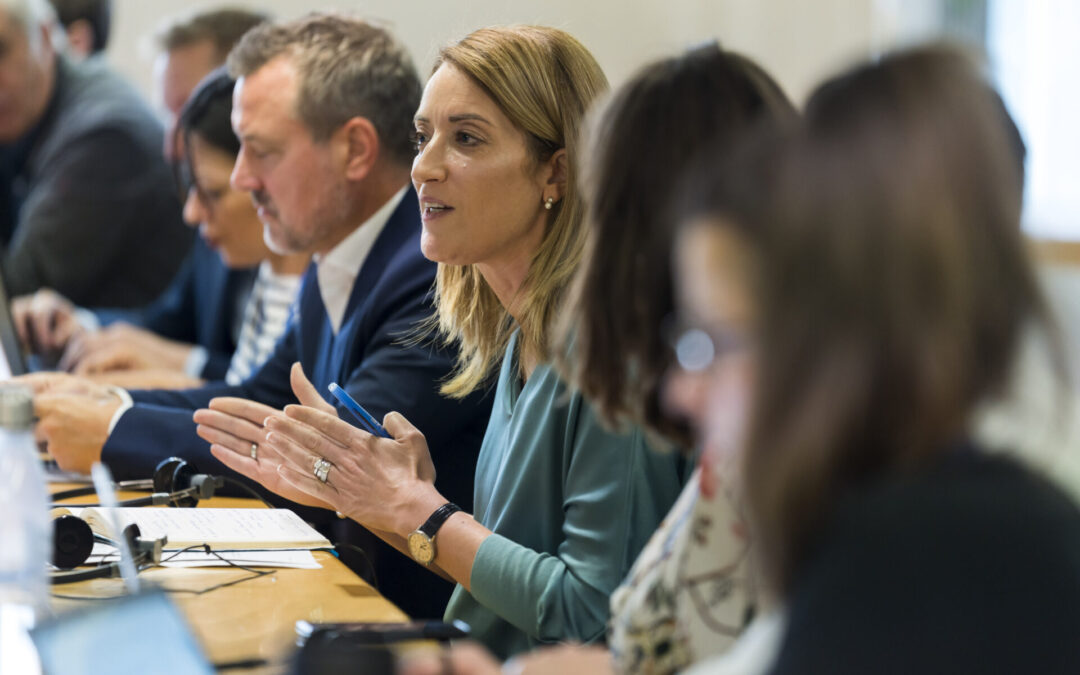 Have the article read by OpenAI (Beta). Please note that AI translations may take some time to process.
Have the article read by OpenAI (Beta). Please note that AI translations may take some time to process.“Next week will be the 3rd of October, ten years since the Lampedusa tragedy when the Mediterranean Sea was called the largest cemetery in the world. And here we are yet again in a situation where we are” the President of the European Parliament, Roberta Metsola, recalled in an interview with the European Newsroom (enr), as the Italian island recently saw thousands of migrants arrive in a few days.
Metsola hoped for a rapid breakthrough in discussions between member states on the reform of EU migration policy, believing that “every effort must be made” to reach an agreement.
One of the key files of the pact on migration and asylum presented by the European Commission in September 2020, was blocked by disagreements between the EU countries. The files were about a system of compulsory solidarity between the bloc in the event of a massive influx of migrants at the borders of a member state.
Hungary, Poland, Austria and the Czech Republic opposed it in July, while Germany, Slovakia and the Netherlands abstained, making it impossible to reach the majority required for adoption. Meanwhile, Germany intends to approve the controversial crisis regulation for the planned EU asylum reform despite ongoing concerns in the governing coalition.
To put pressure on member states to reach an agreement, the European Parliament decided last week to pause negotiations on two other regulations in the migration package aimed at reinforcing external border security.
“I am optimistic because I would not be able to explain to voters how, after a five-year legislature, we failed to find a solution to one of the best legislative proposals we have ever had on the table,”
Metsola stated to the enr.
She added that one “can’t push towards only having the security pillar (of the reform) without the asylum pillar”, meaning the solidarity between member states.
Metsola pointed out that the politically inflamed issue of migration was the top concern in 26 of the European Union’s 28 member states in the 2019 elections. “From citizens to refugees and from job seekers to prime ministers in the European Council, emotions run extremely high at all levels when you put the word migration on the table,” she said.
Belgium will take over the presidency of the European Council in the first half of 2024 and will conduct the negotiations with the parliament from January.
‘Italy cannot be left alone’

Regarding the migratory pressure on Italy, Metsola said that a country that was faced with a massive arrival of migrants like it is happening right now, “cannot feel left alone”. She was referring to Lampedusa which is “an island of 6,000 citizens“ that „suddenly receives 1,700 people one day, another 3,000 another“.
The president of the European Parliament said she was open to Italy’s request to the possibility of a naval mission in the Mediterranean. “This is something we could look at positively,” she says, stressing that the mission would result in “fewer people losing their lives” and that “borders are respected”.
In addition, she also seemed to be in tune with Rome on another point – the EU-Tunisia understanding on migration, wanted by Prime Minister Giorgia Meloni, and which is currently facing rough waters. “Until we have found a solution that allows for the processing of asylum claims outside the territory of the EU,” she concluded, “we will have to dialogue with those countries from which migrants have no other solution than to board a ship.”
Metsola stated that the European Union needed to find a solution according to which asylum requests can be processed outside the territory of the European Union, and until then a dialogue should be conducted with the countries from which migrants depart by boat.
Schengen: Internal border checks “worrying“
Commenting on last week’s border checks by Germany and Poland at the internal Schengen borders, she said that it was politically worrisome for her that there are extended internal border controls.
Metsola added that if the necessary passenger checks were carried out at the external borders, there would be no need to re-establish the internal borders.
“If you think about one of the most significant advantages of the EU and what people outside the EU look at when they think about the EU is freedom of movement. Freedom of movement means you can travel, work,” she noted, saying that the internal borders in the EU are being closed because the policy of guarding the external border is not working well.
She also said Bulgaria and Romania should be admitted to the Schengen area and a positive decision should be expected by the end of the Spanish Presidency of the EU Council. “You have been not only expecting it but deserving it since 2011,” she said.
EU enlargement: Metsola hopes to see negotiation talks with Ukraine by the end of the year
The President of the European Parliament hopes to see the EU open accession negotiations with Ukraine and Moldova by the end of the year, calling for the hopes of these candidate countries not to be “disappointed”.
“If Ukraine and Moldova are ready, accession negotiations should be able to begin, and steps could then be taken gradually, step by step. Each country follows its own path, but let’s not disappoint the millions of people who call Europe their home”, she urged.
In June 2022, in a highly symbolic gesture, the EU granted Ukraine and Moldova candidate status. The European Commission is due to issue a report at the end of October on the progress made by all countries who want to join the EU, and it is expected in particular to recommend the European Council to open accession negotiations for Ukraine and Moldova.
Five countries in the Western Balkans (Albania, Bosnia, Northern Macedonia, Montenegro and Serbia) also have candidate status. Some of them have been negotiating membership for more than ten years.
Metsola also commented on the recent attacks in Kosovo and called all sides to make “genuine efforts to restore calm and stability”.
2024 European elections

Metsola expects a tough campaign for the June 2024 European elections but also for the next EU to have a pro-European, constructive majority.
The EP president said the fight against extremism will be a major challenge in the campaign for the June 6-9 elections. She said she expected the political groups in the next EP to be even more fragmented than now and that they would need more time to define their priorities. The political groups should do so before July 17, 2024, when the new EP will hold its inaugural session.
According to her, it is necessary to combat the extremist groups’ narrative, to understand that there are frustrated, marginalised citizens who have not voted for mainstream parties for years.
“The answer is not from the establishment parties to look to their secure votes, but actually to look at those votes that they’ve lost and ask themselves why they did not talk enough to those people who are marginalised, who have no jobs, who are in rural areas, who feel abandoned or who are in urban areas, who feel unprotected,” Metsola said.
When asked about the main candidate system, according to which each political group should nominate one candidate for the President of the European Commission, and that the position automatically goes to the party that wins the most votes, she said that it worked in 2014. At the time Jean-Claude Juncker was elected President of the Commission as a candidate European People’s Party. But the system was abandoned in 2019, when the European Council nominated Ursula von der Leyen, who did not even run.
The European Council, which nominates a candidate, and the European Parliament, which votes on the candidate, must agree on that question before next year’s elections, Metsola stressed.
If von der Leyen wants to run for re-election, she added, she would have to participate in the campaign as president of the Commission, not as an MEP candidate in her constituency.
Metsola said von der Leyen has done a very good job, although she has not had an easy term, and that one should welcome the fact that she is the first woman at the helm of the Commission.
This article is published weekly. The content is based on news by agencies participating in the enr.
